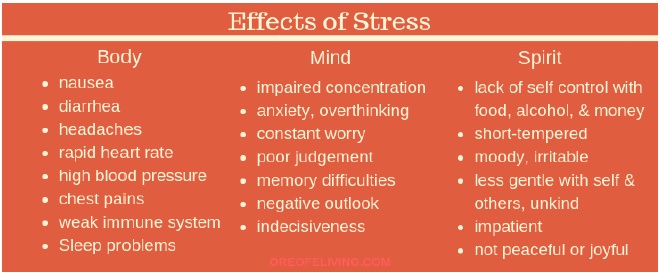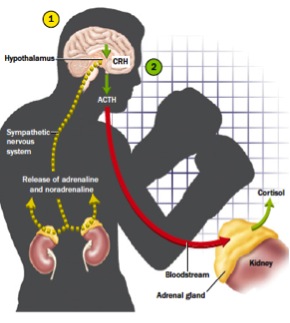Our lives are so busy with a multitude of demands on our time. The effect stress has on our health cannot be ignored and has also been well researched by science. In fact, it is now widely acknowledged that 90% of all illness has its root cause in stress. So, what to do when there’s just so much to be done? Here are two insightful articles I was sent by a friend – one is about the key to happiness (author unknown) and the other relates to living in the “Now”. How often have you been driving a car only to arrive at your destination oblivious of how you actually got there? Or are you planning dinner, going through pick up schedules for the kids or other tasks while driving or doing something completely unrelated? Awareness in the present moment alleviates not only stress, but increases focus and enhances productivity. Leo Tolstoy provides these insightful words about living in the now.

Stress as it happens
 A needling twinge in the torso or a tense interaction with a boss is all you need to get your nerves on edge. The bills are piling up and—of course—your spouse is on your case about them. You feel as if an extra weight is pressing down on your mind. The all too familiar sensation of stress can preoccupy your thoughts, narrowing attention to the sphere of your concerns. But its effects do not end there—stress also causes physical changes in the body. In a stressful situation, alarm systems in the brain trigger the release of hormones that prepare you to fight back or flee the scene. Among other results, these chemicals may boost blood pressure, speed up heart rate and make you breathe faster.
A needling twinge in the torso or a tense interaction with a boss is all you need to get your nerves on edge. The bills are piling up and—of course—your spouse is on your case about them. You feel as if an extra weight is pressing down on your mind. The all too familiar sensation of stress can preoccupy your thoughts, narrowing attention to the sphere of your concerns. But its effects do not end there—stress also causes physical changes in the body. In a stressful situation, alarm systems in the brain trigger the release of hormones that prepare you to fight back or flee the scene. Among other results, these chemicals may boost blood pressure, speed up heart rate and make you breathe faster.
Defence Mechanisms
When we find ourselves in situations that are stressful, the hypothalamus—a structure that lies deep in the brain—sends out an alarm as the body interprets this stress as a potential harmful situation. This triggers two cascades of activity: a rapid response that releases one set of hormones and a more delayed one that releases a different set of hormones. Together these two lines of defence not only enable us to cope with acutely stressful situations but also prepare us for similar future situations by strengthening our memory of what we have just been through.
1. Rapid Response
The hypothalamus sends a signal along fibres of the sympathetic nervous system to the adrenal medulla, located in the core of the adrenal gland just above the kidney. The adrenal medulla then releases the stress hormones adrenaline and noradrenaline, which prepare the body for a rapid fight-or-flight response. Energy reserves are mobilized; blood pressure and heart rate increase to better supply nutrients to the muscles; respiration increases so that more oxygen reaches the brain; natural painkillers are released preventatively; and platelets are activated to minimize blood loss in case of injury.
2. Delayed Reactions
Later the body releases another set of hormones from the hypothalamus, pituitary gland and adrenal cortex in sequence. First, corticotropin-releasing hormone (CRH), which is produced in the hypothalamus, travels along a special network of capillaries to the pituitary gland, an almond-size structure located near the base of the skull. There, CRH triggers the release of another hormone, adrenocorticotropic hormone (ACTH), which travels to the adrenal cortex via the bloodstream and triggers the release of cortisol—the most important human stress hormone. Cortisol boosts the action of adrenaline and noradrenaline while at the same time preparing the body for a return to normal. It puts a damper on the body’s inflammatory and immune responses and promotes the transformation of nutrients into fats and glycogen, thereby replenishing spent stores of energy.
These two responses are designed to help us fight or run in order to avoid danger – in either case, they help our body to respond physically. In actual fact, most stressors experienced these days do not relate to or require a physically active response. Consider sitting in traffic, the office, at the store or at home – more often than not we are quite sedentary during stressful episodes. Add to this that our stressors may be repeated or multiplied many times each day, preventing our body from regaining balance.
These chemical reactions explain how stress can increase blood pressure, cause pain and chronic inflammatory conditions, increase blood sugar levels and even lead to insulin resistance or diabetes.
Addressing stress responses is of paramount importance to regaining health. There are many different avenues open to us to support our bodies – nutrients, herbs, homeopathic remedies, exercise, meditation, diet and lifestyle. If you find that your body is struggling with the demands of everyday life, consult a qualified Naturopath for support and guidance.

